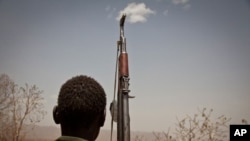The U.N. Security Council has threatened Sudan and South Sudan with sanctions if they do not stop fighting and return to the negotiating table to resolve their differences. Significantly, Wednesday’s resolution had the support of China and Russia.
The measure was adopted unanimously, something that was not certain until just before the vote. China, which has extensive oil interests in the two Sudans, and Russia had expressed reservations about threatening sanctions if the two parties did not comply with the resolution’s demands.
Those demands echo and support an African Union decision from last week. The two sides were given 48 hours to cease all hostilities, including aerial bombardments, and return to the talks within two weeks under African Union guidance to resolve all issues remaining from their separation last July.
China’s U.N. Ambassador Li Baodong said Wednesday that Beijing is “deeply worried” about the recent deterioration of relations between Juba and Khartoum and urged both parties to return to talks. China supported the threat of future sanctions in the resolution, but requested that the qualifier “as necessary” be added to the text.
“We are always very cautious about the use or threat of sanctions," he said. "In the meantime, China has all along maintained that African issues should be settled by the Africans in African ways. We commend and support the unremitting efforts made by the African Union to promote the settlement of the issues between Sudan and South Sudan and welcome the roadmap adopted by the African Union in this regard.”
Russian Ambassador Vitaly Churkin echoed China’s concern about sanctions, saying that diplomatic and political avenues have not been exhausted and sanctions are an extreme measure, but he too supported the resolution.
The United States, which drafted the resolution, reflected the stance of several Western members of the council, saying the resolution underscores the 15-nation council’s strong support for the African Union’s roadmap for peace.
Ambassador Susan Rice cautioned that the two Sudans have come close to the brink of war and risk turning the clock back to the horrors of their past conflict, in which some two million people died.
“The United States calls upon both parties to implement fully and without delay all elements of the African Union Peace and Security Council communiqué, starting with an immediate and unconditional cease-fire," she said. "If either or both parties fail to do so, this council stands ready to act and to impose consequences.”
She added that the goal is not to impose sanctions, but to resolve the conflict.
The international community has expressed concern that the two Sudans risk slipping back into war after South Sudan briefly seized and occupied the oil town of Heglig. Juba pulled its forces back after 10 days amid international demands that it do so. Khartoum said it chased the enemy from the town, but only after there had been significant damage to the infrastructure.
At Wednesday’s meeting, South Sudan Minister of Cabinet Affairs Deng Alor said Juba would comply with the council’s resolution. He also appealed to the United Nations to urgently mobilize humanitarian assistance for southern populations affected by the recent clashes and bombings.
Sudan’s U.N. Ambassador Daffa-Alla Elhag Ali Osman expressed confidence that AU mediation will resolve the outstanding matters between the two Sudans and said settlement of the conflict needs to remain in African hands.
News
UN Security Council Threatens Sudans with Sanctions











